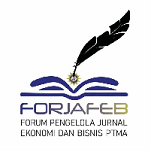PENGARUH REPUTASI AUDITOR TERHADAP MANAJEMEN LABA DENGAN CORPORATE GOVERNANCE SEBAGAI VARIABEL PEMODERASI (PERUSAHAAN MANUFAKTUR YANG TERDAFTAR DI BURSA EFEK INDONESIA)
Abstract
ABSTRACK
The purpose of this study is to examine the effect of the auditor's reputation on earnings management and to examine the effect of the auditor's reputation on earnings management moderated by corporate governance. This study uses three control variables, namely firm size, leverage and market to book value. The data used in this study is secondary data derived from the financial statements of manufacturing companies listed on the Indonesia Stock Exchange in 2013-2015. By using purposive sampling, this study uses 109 sample companies with a period of 3 years, resulting in 327 years of observation. Data analysis method used in this research is Simple Linear Regression with Ordinary Least Squared (OLS) and Moderating Regression Analysis (MRA) approach. The results showed that the auditor's reputation had a significant negative effect on earnings management and Corporate Governance had no effect as moderator of earnings management. Of the three control variables used in this study, only leverage (DER) has an effect on earnings management, while the other two variables ie firm size and market to book value have no effect
Keywords
Full Text:
PDFReferences
Abdullah, S.N. and Mohd-Nasir, N. (2004). Voluntary disclosure and Corporate Governance among Financially Distressed Firms in Malaysia. University Utara Malaysia 06010 Sintok Kedah Darul Aman
Bauwhede, H.V., Willikens, M., & Garemynck, A. (2003). Audit Firm Size, Public Ownership and Firms’ Dicretionary Accruals Management. The International Journal of Accounting. Vol: 38. No: 1. pp. 1-22
Becker, C.L., DeFond, M.L., Jiambalvo, J., & Subramanyam, K.R. (1998). The effect of audit quality on earnings management. Contemporary Accounting Research. Vol: 15. No: 1. pp. 1-24.
Bursa Efek Jakarta, (Online), (www.idx.co.id, diakses 20 Mei 2017)
Cai, C., Zhao, S., & Huang, Y. (2005). Toward The Effect of Audit Quality on Earnings Management-Empirical Evidence From Manufacturing Enterprises Listed in Shangai Stock Market. Journal of Modern
Accounting and Auditing. Vol: 1. No: 2. pp. 69-80
Chen, K., Lin, K., & Zhou, J. (2005), “Audit Quality and Earnings Management for Taiwan IPO firms. Managerial Auditing Journal, 20(1), 86-104.
Darmawati. K. (2005). Hubungan Corporate Governance dan Kinerja Perusahaan. Jurnal Riset Akuntansi Indonesia. Yogyakarta. Ikatan Akuntan Indonesia Kompartemen Akuntan Publik. Vol 8. No. 1. Januari 2005.
Davidson, R.A. & Neu, D. (1993). A Note on The Association Between Audit Firm Size and Audit Quality. Contemporary Accounting Research. Vol: 9. No: 2. pp. 479-488.
DeAngelo, Linda Elizabeth. (1981), “Auditor Size And Audit Quality,” Journal of Accounting and Economics, 3(3). 1981, pp. 183-199.
DeAngelo. (1986). “Accounting Numbers as Market Valuation Substitutes: A Study of Management Buyouts of Public Shareholders.” Thev Accounting Review, 61, 400-420
Dechow, P. M., Sloan, R. G. and Sweeney, A. P. (1995). Detecting Earnings Management. The Accounting Review, pp: 193 - 225.
DeFond, M.L., & Jiambalvo, J. (1994). Debt Covenant Violation and Manipulation of Accruals. Journal of Accounting and Economics, Vol: 17. No: 2. pp. 145-176.
FCGI (2001). Corporate Governance: Tata Kelola Perusahaan. Edisi Ketiga, Jakarta. (Online), (www.fcgi.go.id diakses 30 Mei 2017
Francis, J.R. & Wang, D. (2004). Investor Protection, Auditor Conservatism and Earnings Quality: Are Big 4 Auditors Conservative Only in The United states? Working Paper, University of Missouri. Columbia.
Healy, P.M and Palepu K.G. (2001), “Information Asymetri, Corporate Disclosure and The Capi-tal Markets: A Review of The Empirical Disclosure Literature”, Journal of Accounting and Economics, 31(1-3), 405-440.
Indriantoro, Supomo. (2002). Metodologi Penelitian Bisnis untuk Akuntansi dan Manajemen, Edisi Pertama, BPFE, Yogyakarta.
Jensen, M. C and Meckling, W.H. (1976). Theory of the Firm : Managerial Behavior,
Agency Costs and Ownership Structure . Journal of Financial Economics, October, 1976, V. 3, No. 4, pp. 305-360.
Jeong, S.W. & Rho, J. (2004). Big Six Auditors and Audit Quality: The Korean Evidence. The International Journal of Accounting. Vol: 39. pp. 175-196
Krishnan, G.V. (2003). Audit Quality and The Pricing of Discretionary Accruals. Auditing: A Journal of Practice & Theory. Vol: 22. No: 1. pp. 109-126.
Leuz et al. (2003). Earnings management and investor protection: an international comparison, Journal of Financial Economic 69 (2003) 505 – 527, MIT Sloan School of Management, Cambridge, MA 02142, USA.
Nasution, M dan Setiawan, D. (2007). Pengaruh Corporate Governance Terhadap Manajemen Laba di Industri Perbankan. Simposium Nasional Akuntansi X, Makassar.
Park, J., Lee, M., & Won, J. (1999). Audit Quality Analysis Using Discretionary Accruals. Accounting and Auditing Research. Vol: 35. pp. 289-319.
Petroni, K. R. & Beasley, M. (1996). Errors in Accounting Estimates and Their Relation to Audit Firm Type. Journal of Accounting Research. Vol: 34. No: 1. pp. 151-171.
Rajhi, M.T. & Azibi, J. (2008). Auditor’s Choice and Earnings Management After Enron Scandals: Empirical Approach in French Context. 2008 EABR & TLC Conferences Proceedings, Rothenburg, Germany.
Subramanyam, K. R. (1996), “The Pricing of Dis-cretionary Accruals”. Journal of Accounting and Economics. 22, 249-281.
Sugiyono. (2014). Metode Penelitian Bisnis. Bandung: Alfabeta.
Tsipouridou, M. & Spathis, C. (2012). Earnings management and the role of auditors in an unusual IFRS context: The case of Greece. Journal of International Accounting, Auditing and Taxation. Vol:21. Pp. 62-78.
Warfield, T.D., Wild, J.J., & Wild. K.L. (1995). Managerial Ownership, accounting Choices and Informativeness of Earnings. Journal of Accounting and Economics. Vol: 20. No: 1. pp. 61-92.
Watts, R. L., and Zimmerman, J. L. (January 1990), “Positive Accounting Theory: A Ten Year Perspective,” The Accounting Review. 65(1), 131-158.
Young, S. (1999). Systematic Measurement Error in The Estimation of Discretionary Accruals: An Evaluation of Alternative Modelling Procedures. Journal of Business Finance and Accounting. Vol: 26. No: 7. pp. 833-862.
Zhou, J. & Elder, R. (2001). Audit Firm Size, Industry Specialization and Earnings Management by Initial Public Offering Firms. Working Paper. July
DOI: https://doi.org/10.32502/jab.v2i2.1177
Refbacks
- There are currently no refbacks.
Program Studi Akuntansi Fakultas Ekonomi dan Bisnis, Universitas Muhammadiyah Palembang
Jl. Jenderal A. Yani 13 Ulu, Seberang Ulu II, Palembang (30263), Indonesia.
Indexed by :














.jpg)


